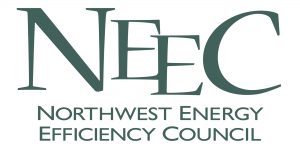Both Washington and Oregon legislatures are in session now. Both states are grappling with big funding issues that dominate the political landscape.
NEEC’s two priority bills had hearings in the Washington House of Representatives last week. Representative Doglio was the prime sponsor of a bill that would have directed the WUTC to enact rules requiring the state’s investor owned utilities to offer a meter based incentive program (aka pay for performance) as an option for interested customers. After successful pilots of this concept by Seattle City Light and the Energy Trust of Oregon and other programs in development by public utilities in the area, NEEC believes that this approach can appeal to a significant component of the commercial and institutional building market. This view alas was not universally shared by those who provided testimony. Opposition to the idea seemed to center on concerns that only some utilities were “singled out” by the bill (though the bill covered all the utilities who can be regulated by the WUTC) and concern that meter based savings approaches were not “cost effective.” It should be noted that there was no language in the bill that in any way changed cost effectiveness requirements. Pay for performance is related to cost effectiveness in much the same way as the relationship between ice cream cones and airplanes.
NEC’s second priority bill was prime sponsored by Rep. Fitzgibbon. It too addressed the opportunity to innovate in program approach by addressing the “frozen in place” dilemma that stringent energy codes present to building owners. Substantial renovations to buildings, which are needed to achieve deep energy savings, trigger energy code requirements. Of course, the goal is to achieve the levels of performance expected in newly constructed buildings, but the opportunity to help with those investment costs is currently very limited. Why? Antiquated notions of “free ridership” restrict utility incentives to savings that go beyond code baselines. The market response is to invest in cosmetic building improvements rather than deep energy savings. Rep. Fitzgibbon’s bill would have amended that process to allow the baseline to be set as the building’s current level of energy performance. Alas, innovation in energy efficiency program approaches is hard and the bill received vocal opposition in the hearing.
NEEC is not anticipating further action on these bills but we appreciate the support of Representatives Doglio and Fitzgibbon and a host of co-sponsors for their support. In the interim, we intend to work with other stakeholders on the merits of these ideas.
Given the more recent start of the session in Oregon, not much to report at this time. A more comprehensive discussion will come next month.
